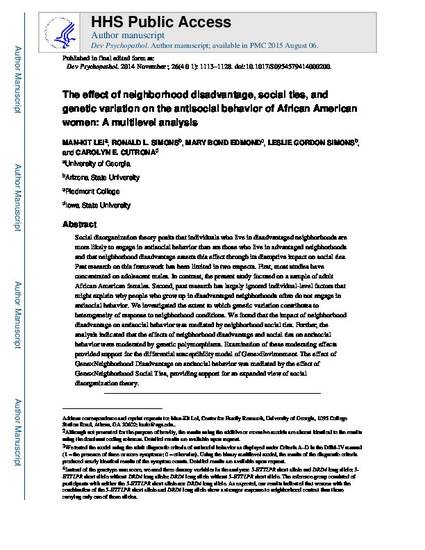
Social disorganization theory posits that individuals who live in disadvantaged neighborhoods are more likely to engage in antisocial behavior than are those who live in advantaged neighborhoods and that neighborhood disadvantage asserts this effect through its disruptive impact on social ties. Past research on this framework has been limited in two respects. First, most studies have concentrated on adolescent males. In contrast, the present study focused on a sample of adult African American females. Second, past research has largely ignored individual-level factors that might explain why people who grow up in disadvantaged neighborhoods often do not engage in antisocial behavior. We investigated the extent to which genetic variation contributes to heterogeneity of response to neighborhood conditions. We found that the impact of neighborhood disadvantage on antisocial behavior was mediated by neighborhood social ties. Further, the analysis indicated that the effects of neighborhood disadvantage and social ties on antisocial behavior were moderated by genetic polymorphisms. Examination of these moderating effects provided support for the differential susceptibility model of Gene × Environment. The effect of Gene × Neighborhood Disadvantage on antisocial behavior was mediated by the effect of Gene × Neighborhood Social Ties, providing support for an expanded view of social disorganization theory.
Available at: http://works.bepress.com/carolyn_cutrona/12/

This is the accepted manuscript of an article published in Development and Psychopathology 26 (2014): 1113–1128, doi:10.1017/S0954579414000200. Posted with permission.